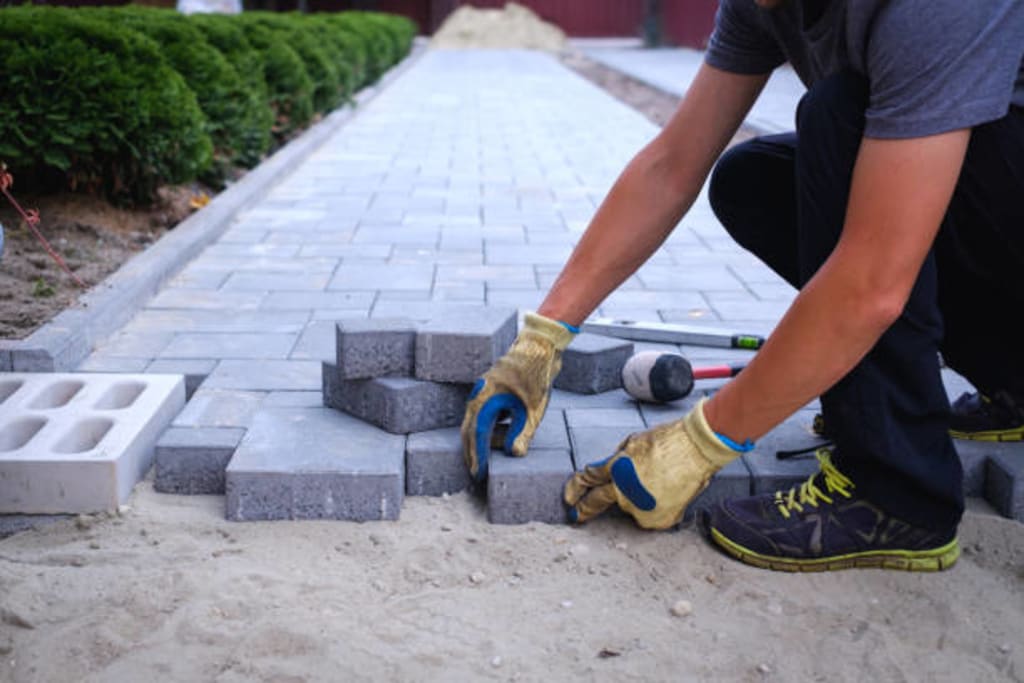Beautiful Stone Pavers. How to Lay Paving Stones?
How much do the pavers cost? It depends on its type.

If you are planning to make pathways or a patio around your house, you may be wondering which material to choose. Making the right decision is not easy. The main objective is to improve the appearance of the area around the house and adapt it to it. Many homeowners choose to lay pavers. Paved roads are quite cheap, which is a great advantage of this solution. There are many types of paving stones, which differ in their quality and properties. Check the most important information you need to know before finishing the property.
Paving stones - the choice of the right material
Before you start working on the paths and patio, you must choose the right material. You can get many different types of paving slabs. When choosing the right one, you should pay attention to the material, its color and the overall effect you expect from the flooring. The price of the material is a crucial aspect as well. Please note that prices differ, depending not only on the material but also on the size and thickness of the stones. Manufacturers often price by weight, so make sure you know how sufficient the material is.
How much do the pavers cost? It depends on its type.
Natural Stone (Granite) Pavers – These pavers are made from natural material. For this reason, it is the most expensive option.
Industrial (concrete) pavers - pavers produced from molded concrete. These pavers are mass-produced, so their price is lower.
Please note that the price depends on the thickness and size of the material. Manufacturers usually set their prices per unit weight (ton), so the effectiveness of the pavers must be taken into account.
If you want to hire a professional to lay your flooring, keep in mind that the price of the service includes several aspects. For example, it is important if the stones are all one color or if you want to arrange them in a pattern. Land preparation is also included in the price.
Paving stone laying - quality and price
Having decided on the paving stones for your garden, you will be wondering which pavers is the best. The main points of interest are the quality of the material, aesthetics, price and practicality. All these aspects must be considered before buying the material.
Concrete paving slabs
Industrial pavers are usually made of concrete. The material is concentrated and condensed, with the addition of as little water as possible. Thanks to the addition of colored sand and pigmentation, the stones have various colors. The coloring can affect the entire paving stone or just its surface. The main advantages of concrete pavers are:
• Durability - concrete stone is rarely damaged, and manufacturers implement various methods to harden the material.
• Frost resistance - industrial pavers can be characterized by low water absorption. Due to this characteristic, water does not enter the material and therefore frost cannot damage it.
• Many designs - manufacturers offer pavers in various shapes and colors. This wide selection makes it easy to match the stones to your home's design. In this sense, concrete slabs are better than natural stone pavers.
• Wide range of prices - is the biggest advantage of this type of material. You will surely find the right product for you even if your budget is very limited. The cost of installing a concrete floor by a professional is also much lower than with a granite stone.
The biggest disadvantage of concrete stone is its lower resistance compared to natural stone.
Natural stone for paving
Natural stone is a good alternative to concrete pavers. The most popular choice in this category is granite. The price of this material is much higher than that of concrete. However, granite is valued for its characteristics, such as:
• Damage Resistance - Granite is resistant to crumbling, abrasion, and discoloration. Once laid, this type of paver will last a long time.
• Fire and frost resistance - low temperatures are not dangerous for granite pavers. They also cannot be destroyed by heat or fire.
• Natural material - the extraction of granite is ecological and does not involve the use of any chemical products.
• Elegant appearance - natural stone is very elegant. It is a perfect solution for homeowners who want to combine the aesthetics and durability of granite. This material will suit most classically designed homes.
The biggest disadvantage of granite pavers is their uneven surface, which is difficult to clear of snow.
How are the pavers laid? step by step guide
Deciding to pave the paths yourself is a great way to significantly reduce costs. It's not as hard as it looks. All you need is a good preparation.
• If you decided to lay pavers on your own, you might wonder what type of material you should choose. Although price is important, it should not be the deciding factor. The thickness of the paving stone must be suitable for the intended use of the paving. You should also predict the resistance of the material to mechanical damage. For example, 4-centimeter-thick pavers are good for garden paths, while a material that is twice as thick should be used for a patio. The paving slabs must also visually harmonize with the building.
• Before you start laying the pavers, dig a depth in the area where you plan to lay the stones. The depth depends on the use that is going to be given to the pavement. For garden paths it is usually 15-20 cm. For heavier use, the depth should be at least half a meter. Shape the bottom so that water can be washed away.
• Before laying the pavers, you should start at the edges. For small paths, paving curbs or palisades can be used. At points where vehicles are to be moved, you should use large road curbs. Place the elements on a layer of concrete. After it dries, fill in the gaps with sand. Be sure to be very precise, so that the curbs are nice and even.
• Place and compact the aggregate, then create a base with concrete and sand. Then you can start laying the pavers. You can place them alternately or in patterns. Make sure you don't step on the base, you can, however, step on the laid tiles. Arrange the stones as tightly as possible and be sure to mix the elements, choosing them from different palettes. Paving stones need to be pressed. You can use a surface vibrator for this purpose.
You can lay the pavers yourself, or you can hire a professional to do it for you. One of the most important issues is choosing the right material. The price may be the decisive aspect, however, you should also pay attention to the appearance and durability of the pavers.
If you finish laying pavers around your house, you could finish other elements. Check what patio and stair tiles are available on the market and how to lay them. Get inspired and create your own pallet furniture. Create a unique space in your garden.
What is the pavement made of?
Paving stones are made of concrete or natural stones. Concrete is the most widely used material, however natural granite paving stones are the most durable of all.
How to clean the pavers?
For light dirt you can use soapy water, brushing the area. If the pavers are very dirty, pour a mixture of water and vinegar over them. The fastest way to clean your patio is to use a pressure washer.
How are pavers cut?
The fastest way to cut paving stone is by using a circular saw or angle grinder. The brick splitter is easier to use. If you don't have such equipment, you can use a hammer and chisel.





Comments
There are no comments for this story
Be the first to respond and start the conversation.